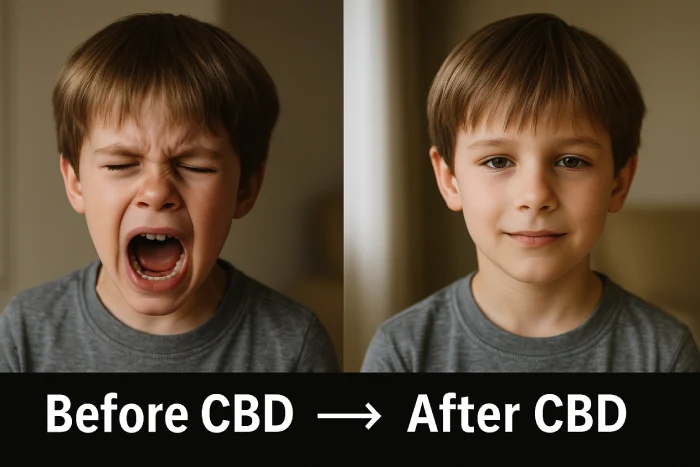Key Points
- Research suggests CBD may help reduce anxiety, aggression, and social difficulties in autistic children, but evidence is limited and not conclusive.
- Safety concerns include potential side effects like nausea and drowsiness, requiring consultation with healthcare professionals.
- This article combines scientific studies, expert input, and practical advice for parents.
Key Citations
- Children and adolescents with ASD treated with CBD-rich cannabis exhibit significant improvements particularly in social symptoms: an open label study
- Cannabinoids and Autism Spectrum Disorder: A Systematic Review
- CBD and Autism: Exploring the Benefits, Risks, and Research
- Is there research on the use of cannabis products with children with autism?
- CBD-enriched cannabis for autism spectrum disorder: an experience of a single center in Turkey and reviews of the literature
- Cannabidiol for Children with Autism and ADHD Study
Introduction: Why Parents Are Exploring CBD For Autism
As a parent of a child with autism spectrum disorder (ASD), you may be exploring alternative treatments to support your child’s well-being.
Cannabidiol (CBD), a non-psychoactive compound derived from hemp, has gained attention for its potential to alleviate symptoms like anxiety, aggression, and social difficulties in autistic children.
However, the research is still emerging, and safety concerns remain.
This article provides an evidence-based, practical guide to help you understand CBD’s potential benefits, risks, and considerations for your child.
⚠️ Disclaimer: Always consult a licensed pediatrician or neurologist before introducing CBD to your child. This guide is for educational purposes only and does not replace professional medical advice.
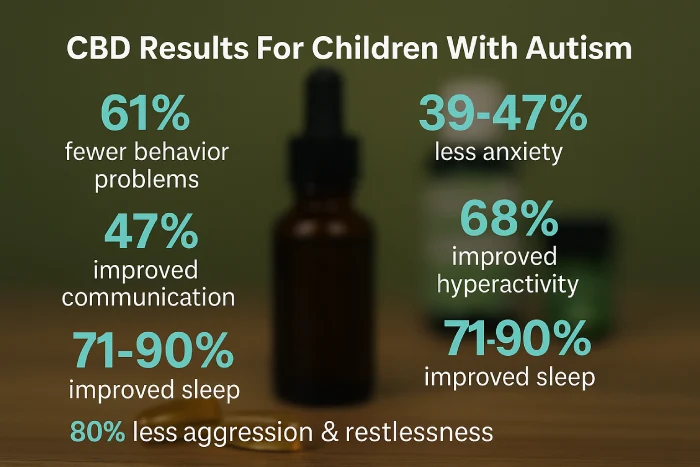
What Is CBD And How Does It Differ From Medical Marijuana?
CBD is a compound extracted from the cannabis plant, typically containing less than 0.3% THC (the psychoactive component that causes a “high”).
It interacts with the body’s endocannabinoid system (ECS)—a network of receptors that help regulate mood, sleep, inflammation, and more.
According to a 2021 study in Trends In Psychiatry & Psychotherapy, the ECS is responsible for regulating emotional responses, mood, behavioral reactions to the context and social interactions.
While CBD is legal in the U.S., when derived from hemp, it’s often mixed with a carrier oil, such as coconut oil, for consumption.
Medical marijuana, on the other hand, contains higher levels of THC, is psychoactive, and its legality varies by state, often requiring a prescription.
| Aspect | CBD Oil | Medical Marijuana |
| THC Content | <0.3%, non-psychoactive | Contains THC, psychoactive |
| Legality | Legal in U.S. if hemp-derived | Illegal federally, legal in some states |
| Use for Autism | May reduce anxiety, aggression, irritability, sleep, and more | Limited research, higher risk for kids |
Potential Benefits Of CBD For Autistic Children
Research suggests CBD for autism may benefit some children, particularly in managing behavioral and social challenges.
Key findings include:
- Social Communication: A study found significant improvements in social communication among children with ASD treated with CBD-rich cannabis, with ADOS-2 Social Affect scores showing progress.
- Behavioral Symptoms: A systematic review reported a 47% improvement in communication problems and reductions in stereotyped behaviors in some studies.
- Anxiety and Aggression: Families have reported reduced aggression and anxiety, enabling better use of calming techniques during outbursts (Autism Parenting Magazine).
- Seizures: CBD has shown promise in reducing seizures, as seen in the case of Charlotte Figi, whose seizures dropped dramatically with Charlotte’s Web CBD oil.
These findings are promising but not conclusive, as most studies are small or lack rigorous controls.
🧠 Did You Know? NYU Langone Health is currently running clinical trials on the use of CBD in children with autism and ADHD.
A Mother’s CBD Journey With Her Autistic Son (Reddit Case Study)
In a heartfelt Reddit post, one mother shared how CBD oil helped her 11-year-old son with severe autism-related behaviors — including meltdowns, violent outbursts, and emotional dysregulation.
With medical supervision and a carefully adjusted CBD:THC ratio, the transformation was dramatic: tantrums stopped, social engagement blossomed, and their family life improved profoundly.
While this story offers hope, it also reflects the complexity of using CBD for autism — highlighting legal restrictions, individual variability, and the importance of professional guidance.
👉 Read the full case study, including detailed dosing, product notes, and clinical context.
A Mother’s CBD Journey With Her Autistic Son – Full Article »
“CBD didn’t cure our son. It gave him access to his best self.”
Is CBD Safe For Children With Autism?
CBD (cannabidiol) has shown promise in treating certain pediatric conditions, notably specific forms of epilepsy.
However, its use in children, especially for autism spectrum disorder (ASD), requires careful consideration due to limited long-term safety data and potential side effects.
⚠️ Key Safety Considerations:
- Limited Long-Term Data: The Journal Of Pediatric Pharmacology & Therapeutics emphasizes the need for more comprehensive research to fully understand the long-term effects of CBD use in children.
- Potential Side Effects: The Mayo Clinic reports side effects such as dry mouth, diarrhea, reduced appetite, drowsiness and fatigue.
- Drug Interactions: CBD can interact with other medications metabolized by liver enzymes, potentially altering their effectiveness or increasing side effects.
- Product Quality and Labeling: The lack of regulation in the CBD market means product quality can vary significantly. Some products may contain higher levels of THC or other contaminants, posing additional risks. St. Louis Children’s Hospital
✅ Recommendations For Parents:
- Consult Healthcare Providers: Always discuss with your child’s pediatrician or a specialist before starting CBD to ensure it’s appropriate and to monitor for potential interactions or side effects.
- Choose Reputable Products: Opt for CBD products that are third-party tested, have clear labeling, and provide Certificates of Analysis (COAs) to confirm their contents.
- Monitor and Document: Keep a detailed log of your child’s CBD usage, including dosages, times, and any observed effects or side effects, to share with healthcare providers.
While CBD may offer benefits for some children with ASD, it’s essential to approach its use cautiously, prioritizing safety and professional guidance.
Choosing The Best CBD Product For An Autistic Child
Selecting a high-quality CBD product is critical.
Consider:
- Source: Choose hemp-derived CBD with <0.3% THC, such as Joy Organics, known for quality.
- Third-Party Testing: Select products with lab reports verifying purity and potency.
- Form: Oils or tinctures allow precise dosing, while gummies may be child-friendly.
Not all CBD is created equal.
Here’s how to evaluate products with confidence:
1. THC-Free or Broad-Spectrum Formulas Only
- Avoid full-spectrum products (which may contain trace THC), if you live in states with more strict CBD laws.
- Choose broad-spectrum or isolate CBD that is guaranteed THC-free.
2. Prefer Oils or Gummies with Precise Dosing
| Form | Pros | Cons |
| Oil / Tincture | Adjustable dose; fast-acting under tongue | Some children dislike taste |
| Gummies | Child-friendly; pre-measured | Slower onset; sugar content may vary |
| Capsules | Easy for teens; travel-friendly | Not ideal for young children |
| Topicals | Useful for skin irritation | Not suited for behavioral or neurological symptoms |
3. Check for Third-Party Lab Results
Only buy from brands that offer:
- Potency reports (confirming the actual CBD mg per serving)
- Zero THC verification
- Tests for pesticides, heavy metals, and residual solvents
Top CBD Brands For Autistic Children (Based On Lab Results, Transparency, & Pediatric Use Cases)
These are not endorsements.
Always consult a pediatrician first.
| Brand | Why It’s Recommended | Form | THC-Free? | Notes |
| Joy Organics | USDA-certified organic; broad-spectrum | Gummies, Oils, Pills | ✅ | Flavored oils available |
| cbdMD | NSF Certified; pediatric formulations | Oil, Gummies, Pills | ✅ | Offers CBD + melatonin |
| A Gift From Nature | Full lab transparency; high potency | Oil, Gummies, Pills | ✅ | Large tasty collection of gummies |
| PlusCBD | Founded by autism-focused parents | Oil, Gummies | ✅ | Manufactured in our cGMP certified facility |
Ready to Explore Trusted, THC-Free CBD Options for Your Child?
Discover lab-tested, parent-approved products and expert tips in our full guide:
👉 Best CBD for Autistic Child: Top Products & Parent’s Guide
Is CBD Legal for Children with Autism?
Yes—CBD derived from hemp (with 0.3% THC or less) is federally legal under the 2018 Farm Bill.
However, states may have additional restrictions.
- Legality: Hemp-derived CBD is legal in the U.S., but check state laws for restrictions. Medical marijuana is illegal federally but permitted in some states with a prescription.
- Consultation: Work with a healthcare professional to assess CBD’s suitability and monitor side effects.
- Monitoring: Keep a journal to track your child’s response, noting changes in behavior, sleep, or side effects.
Idaho Example (as of 2025):
- Only CBD with 0.0% THC is allowed.
- Products must come with a COA proving THC-free status.
🔒 Always choose broad-spectrum or CBD isolate labeled as “THC-Free.”
How Much CBD Should You Give A Child with Autism?
⚠️ There is no FDA-approved dosage of CBD for autism.
However, data from anecdotal reports and the systematic review publish in 2021 Trends In Psychiatry & Psychotherapy reports suggest starting low and slow.
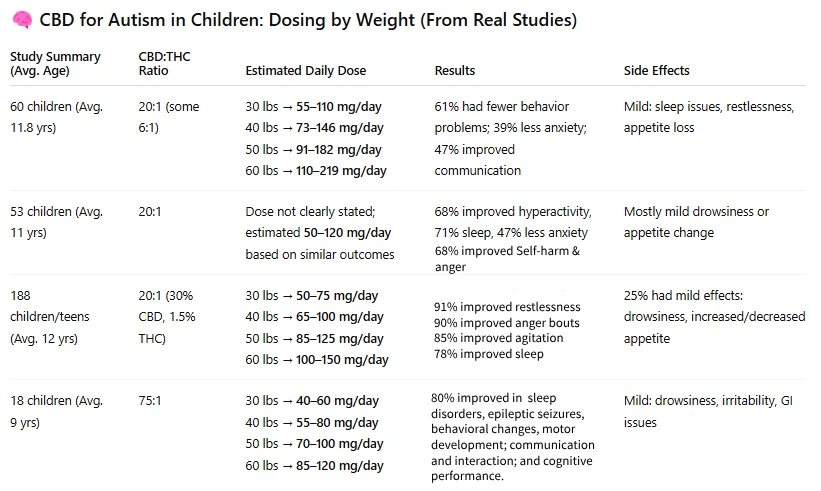
How to Use This Table:
- Start Low: Begin at the lowest mg range for your child’s weight.
- Go Slow: Increase every 3–5 days if needed, split into 2–3 doses per day.
- Observe Closely: Watch for changes in sleep, behavior, appetite, anxiety, and attention.
- Use High-CBD Products: All studies used a CBD:THC ratio of at least 20:1 to reduce THC-related side effects.
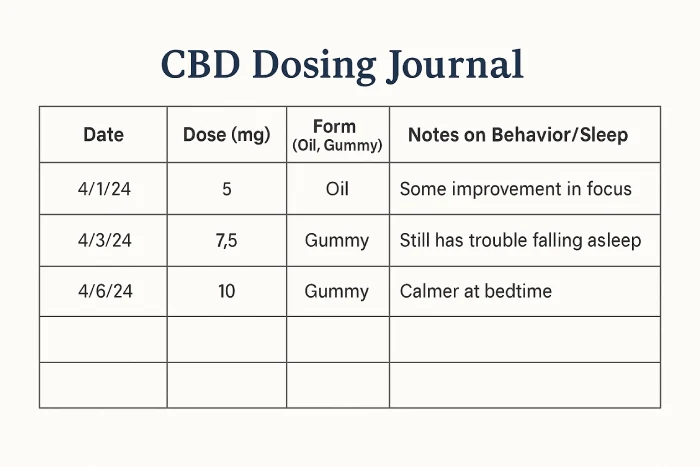
Track Progress with a CBD Dosing Journal
When starting CBD for your child, keeping a daily CBD dosing log (or journal) can be incredibly helpful.
Tracking your child’s weight, the product used, dose amounts, times given, and any noticeable changes in behavior, sleep, mood, or appetite will help you and your care team fine-tune the approach over time.
It also makes it easier to spot patterns, avoid side effects, and communicate clearly with your pediatrician or specialist.
✅ Download our free printable CBD Dosing Log (PDF)
CBD Dosing Log for Children with Autism – Download PDF
We recommend logging at least the first 30 days and updating as doses are adjusted.
What To Look For When Buying CBD For Children
Use this checklist to ensure you’re choosing a safe, legitimate product:
✅ Clearly labeled “THC-Free” or “Broad Spectrum”
✅ Third-party COA for each batch
✅ Child-appropriate formulation (low-dose gummies or unflavored oil)
✅ Organic hemp, no synthetic additives
✅ Transparent contact info and return policy
✅ Reviewed or recommended by trusted health professionals
Current Research And Future Directions
Research on CBD for autism is ongoing but limited.
Studies like one from NYU Langone Health are exploring CBD’s effects on autism and ADHD, but results are pending.
Larger, randomized controlled trials are needed to confirm efficacy and safety.
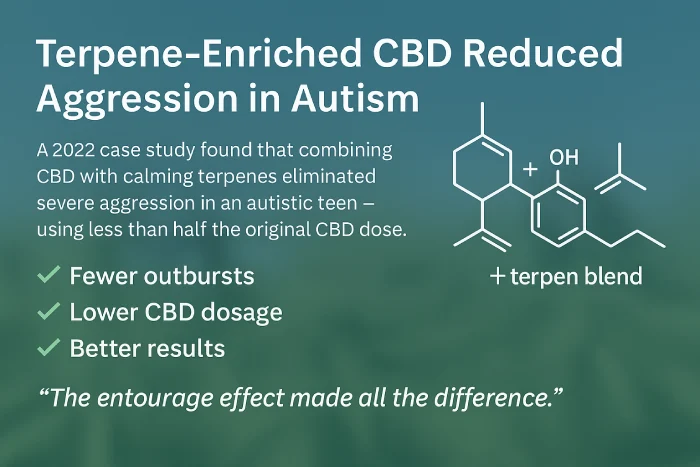
Study Spotlight: Terpene-Enriched CBD Oil For Autism Symptoms
A compelling case report published in Frontiers in Pharmacology (2022) highlights the potential benefits of combining CBD with specific terpenes to manage autism spectrum disorder (ASD) symptoms
Case Summary
- Patient Profile: An adolescent with ASD who initially responded well to pure CBD during childhood.
- Challenge: During puberty, the patient experienced increased hyperactivity, agitation, and severe aggressive behavior. Increasing the CBD dosage alone did not yield significant improvements.
- Intervention: Introduction of a terpene-enriched CBD oil, incorporating compounds known for their calming and anxiolytic properties.
- Outcome: The enriched formulation led to a gradual elimination of aggressive episodes, achieved with less than half the CBD dose previously used.
Key Takeaways
- Enhanced Efficacy: The addition of specific terpenes appeared to amplify the therapeutic effects of CBD, suggesting a synergistic “entourage effect.”
- Reduced Dosage: Effective symptom management was achieved with a lower CBD dose, potentially minimizing side effects and costs.
- Safety Profile: Terpenes used in the formulation have a high safety index and can be easily incorporated into cannabinoid products.
Implications for Treatment: This case underscores the importance of personalized approaches in ASD management. For individuals who do not respond adequately to pure CBD, terpene-enriched formulations may offer a viable alternative.
Note: While this case provides valuable insights, it represents a single patient’s experience. Further research, including larger clinical trials, is necessary to generalize these findings.
Talking To Your Pediatrician, Legal Factors, Dosage, & FAQs
How to Talk to Your Pediatrician About CBD for Your Autistic Child
Introducing CBD into your child’s care plan requires open communication with your healthcare provider.
Here’s how to have a productive, informed conversation.
Step-by-Step Script
- Start with the research:
“I’ve been reading peer-reviewed studies and parental reports about CBD possibly helping with symptoms like anxiety, aggression, or sleep issues in children with autism.” - Share your concerns:
“I’m not looking for a miracle cure—just wondering if CBD might be a helpful complementary option.” - Ask about drug interactions:
“Are there any concerns about how CBD could interact with my child’s current medications?” - Request monitoring:
“If we try it, could you help us monitor side effects or changes in behavior?”
📝 Tip: Bring a product label and Certificate of Analysis (COA) for review.
Frequently Asked Questions (FAQs)
❓ Can CBD make autism symptoms worse?
Rarely. Some children may experience irritability, fatigue, or changes in appetite—especially with too high a dose. This is why medical supervision is essential.
❓ Will CBD interfere with autism therapies like ABA or speech therapy?
CBD is not known to interfere with therapy. In some cases, it may help reduce barriers like aggression or anxiety that limit therapy effectiveness.
❓ Can I give my child CBD and melatonin together?
Some products combine them safely. Always check with your pediatrician first to avoid over-sedation.
❓ Should I tell my child’s school or therapist we’re using CBD?
Yes. Open communication ensures that caregivers and educators can monitor changes in mood or behavior consistently across environments.
Final Thoughts: Proceed With Caution, Empowerment, & Guidance
CBD is not a cure for autism.
But it may provide symptom relief for some children—especially when carefully selected, legally compliant, and used under pediatric supervision.
✨ When it comes to choosing the best CBD for your autistic child, the real answer isn’t just about what’s in the bottle—it’s about the partnership between parents, doctors, and data.
💬 Ready To Explore Trusted CBD Options?
➡️ See our curated list of safe, third-party tested CBD brands for children with autism
➡️ Or download our CBD Parent Journal Template to track your child’s response
➡️ Also download
About The Author
Joseph Powers is the founder of Legal CBD Idaho and a trusted voice in Idaho’s hemp and CBD space. With over a decade of experience in cannabis compliance and education, Joseph is committed to helping Idahoans confidently understand what’s legal, what works, and where to buy safe, effective CBD products in the state.
A Twin Falls local, Joseph brings a consumer-first approach to navigating Idaho’s strict laws around hemp-derived CBD. He personally reviews legal updates, verifies product claims, and explains everything in plain English—so you can make informed, stress-free decisions about your wellness.
Joseph is not affiliated with any CBD brand, ensuring every review and guide on this site is unbiased and rooted in facts, not hype. Whether you're just curious or looking for trusted products that meet Idaho’s 0.0% THC requirement, his goal is simple: to give you honest answers backed by research, not rumors.
Got a question about CBD in Idaho? Email Joseph directly at joe@legalcbdoilidaho.com.

